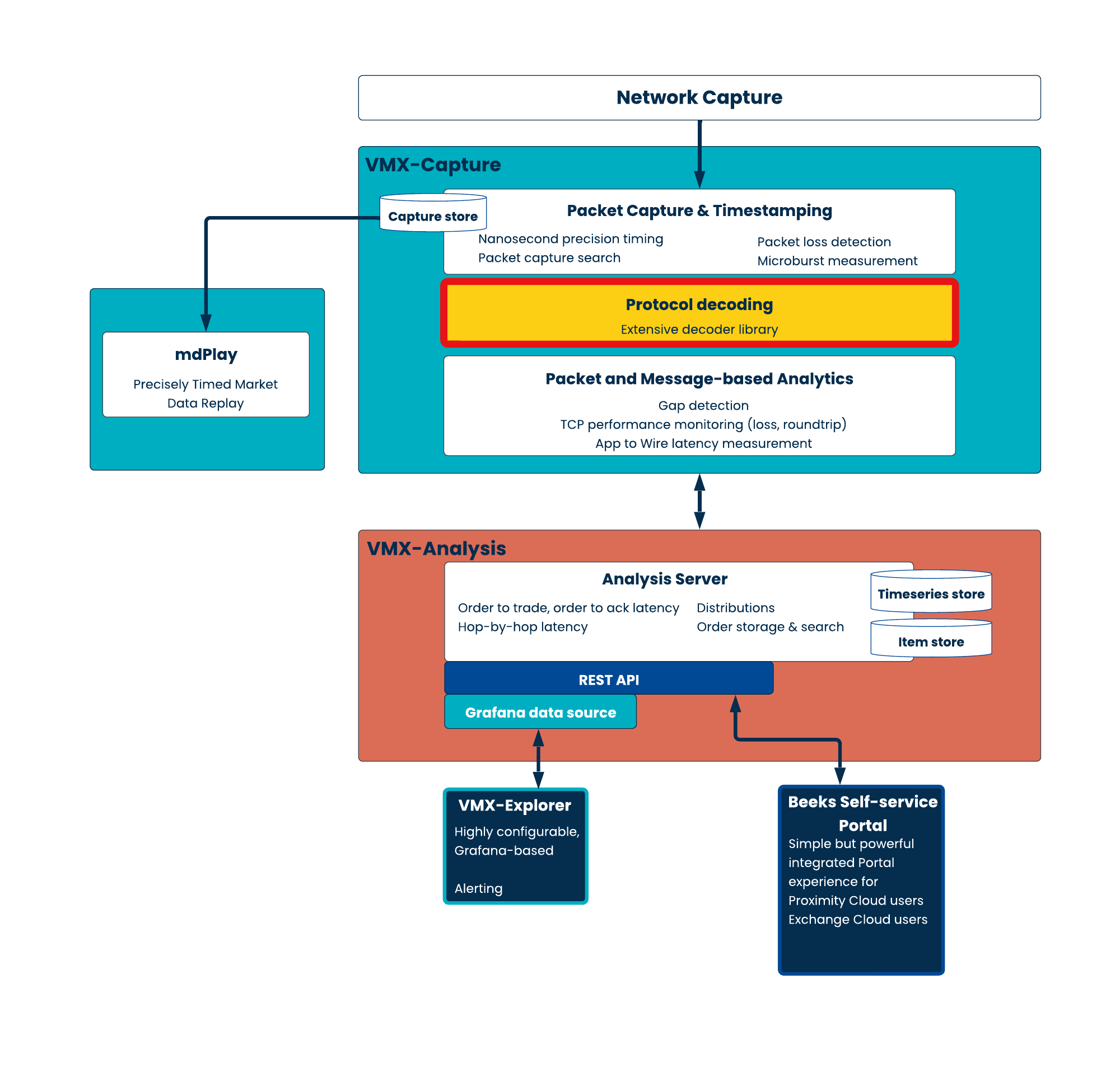To enable Beeks Analytics to analyse packets in a variety of data formats, Beeks uses a range of decoders that map the original data format to Beeks internal format. Beeks Analytics has off-the-shelf decoders for the majority of the world’s financial markets and common underlying protocols.
Decoders are one of the VMX-Capture component parts of the overall Beeks Analytics open architecture (see diagram below). See the Beeks Analytics Concepts Guide for more information about VMX-Capture and the overall Beeks Analytics open architecture. For a detailed guide to VMX-Capture functionality and configuration, see the Configuration Guide for VMX-Capture.
This document lists the different decoders that are supported for Beeks Analytics. If you have a requirement for a market that you do not see here, contact your Beeks Sales Representative or Client Contact to discuss scheduling.
This document also provides technical information about writing your own decoders or defining your messages using JSON (JavaScript Object Notation).
Beeks' extensive decoder support and open architecture help you deliver optimal network performance. Write your own decoder or Advanced Configurable Decoder to meet your custom requirement and unlock analytics that indicate how the system scales to support your workload. Alternatively, apply our off-the-shelf decoders of standard traffic to gauge performance .
Commercials
There is no extra cost to the customer to keep decoders up-to-date for public changes. The cost of developing updates for public changes is included in the product price.
Beeks endeavours to ensure that all decoders listed in this document are fully up-to-date. As part of the implementation of Beeks Analytics, your dedicated Implementation and Delivery team perform a full analysis of captured traffic. Any updates necessary are included in the product price.
Custom Decoder Development
Beeks Analytics makes it easy to support private messaging protocols.
The easiest way to develop against private messaging protocols is to use the Advanced Configurable Decoder (ACD)™.
Introduction to the Advanced Configurable Decoder (ACD)™
The ACD allows Beeks Analytics clients to define decoders in JSON configuration. The advantage of the ACD is that, once a protocol is implemented using this configuration, there is no release, retest, and reinstall cycle for minor changes in the protocol's specs. Rather than needing development (sometimes by third-parties) against an SDK to respond to internal messaging changes, you can simply update the JSON configuration.
This document contains guidelines on how to implement decoders using the ACD (see Advanced Configurable Decoder ).
It is also possible for the Beeks Analytics team to develop decoders to match private message specifications, e.g. for particularly extreme performance requirements or unique message format requirements. Speak with your Beeks contact for more information.
Other decoder technologies available as part of Beeks Analytics
The ACD™ is increasingly used by Beeks Analytics to develop our newer decoders for fixed-offset feeds. However, other decoder types are also offered for different use cases. These decoder types are as follows:
C++ decoders
These provide the absolute fastest performance. They are custom-built by the Beeks Analytics team to suit specific markets.AutoMD
This high performance decoder is focused on decoding the headers of sequenced multicast data and is designed in particular to perform gap detection at high traffic volumes. The most common use case for AutoMD is for multicast market data. Most standard market data multicast feeds will work as standard with AutoMD, even if the protocol has never been observed before by Beeks Analytics.SBE
The Simple Binary Encoding (SBE) protocol decodes and encodes messages in binary format, which is optimized for low latency and deterministic performance. The SBE decoder takes an SBE message schema as its input, so no further development or decoder release is necessary to stay up to date with protocol changes.Decoder Software Development Kit (SDK)
This is a standard SDK for any type of protocol decoding requirement. This document contains the reference for the SDK, as well as guidelines for how customers can use it to write your own decoders.
This document also describes the off-the-shelf decoders that are packaged with Beeks Analytics (see Beeks Analytics off-the-shelf decoders ).
Mapping decoders to particular traffic
With our out-of-the-box configuration management system, decoders will be mapped automatically in most cases, and there is no need to perform manual mapping of decoders to particular IP addresses or ports.
